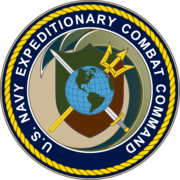|
Navy Expeditionary Combat Command
The Navy Expeditionary Combat Command (NECC) is an echelon III command of the United States Navy, which serves as the single functional command to centrally manage current and future readiness, resources, manning, training and equipping of the United States Navy's 21,000 expeditionary forces who are currently serving in every theater of operation. The NECC was established in January 2006.[1] NECC is a subordinate command of the Navy's Fleet Forces Command. NECC components offer functions such as command and control of expeditionary warfare operations, training, maritime and port security, logistics support, construction, littoral and coastal warfare and patrol, coastal riverine warfare, explosive ordnance disposal (EOD), expeditionary diving and combat salvage, and combat photography. PurposeNECC aligns disparate expeditionary capabilities to coordinate expeditionary practices, procedures and requirements in the joint battlespace. NECC integrates all warfighting requirements for expeditionary combat and combat support elements, consolidating and realigning the Navy's expeditionary forces under a single command to improve fleet readiness. NECC's goal is to improve efficiencies and effectiveness through economies of scale. NECC changed how the U.S. Navy organizes, trains and equips its forces to meet the Maritime Security Operations and Joint contingency operations requirements. NECC is not a stand-alone or combat force, but rather a protection force that fills the gaps in the joint warfare arena and complements capabilities of foreign military partners. As an asset to operational commanders, NECC is designed to provide an array of capabilities that are unique to the expeditionary maritime environment as opposed to the blue water and land warfare environments. NECC seamlessly operates with the other services and coalition partners to provide cooperative assistance as requested. This redistribution of support places naval forces where they are needed the most and establishes new capabilities in support of Maritime Security Operations. Individual training and qualificationsMembers of most NECC Commands are generally expected to seek qualification for the Enlisted Expeditionary Warfare Specialist Insignia. Unless they belong to specialized communities and training which require them to qualify for their respective badge such as Seabee Combat Warfare Badge, Navy Diving Badge or Navy Explosive Ordnance Disposal Badge. Component commands of the NECC The NECC's component commands included in January 2007:[2]
On the 2007 "Navy Times" list of component commands was Maritime Civil Affairs. In May 2014 the Navy disestablished its only civil affairs formation, the Maritime Civil Affairs and Security Training Command (MCAST). McFate, writing in 2020, argued that the disestablishment of MCAST illustrated the Navy's relative prioritisation of partnerships and partnership building as opposed to combat capability.[3] NECC in War on TerrorismThe United States Navy Riverine Squadrons of the United States Navy are elements of the NECC that have taken active part in the land operations in support of the Army and USMC units. According to the Navy: "The Navy's Riverine force focuses on conducting Maritime Security Operations and Theater Security Cooperation in a riverine area of operations or other suitable area. The force is capable of combating enemy riverine forces by applying fires directly, or by coordinating supporting fires. It will share battle space with the other Services in an effort to close the seams in Doctrine, Tactics, Techniques, and Procedures, and Command, Control, Communications, Computers, Intelligence, Surveillance and Reconnaissance."[4] As of 2008, three riverine squadrons are active in the Navy, all under the command of Riverine Group 1, located in Norfolk, Virginia. Riverine Squadron 1 (RIVRON 1) deployed to Iraq in April 2007 and was relieved by Riverine Squadron 2 (RIVRON 2) in October 2007.[5] Riverine Squadron 3 (RIVRON 3) was established in July 2007[6] and will presumably relieve RIVRON 2 in Iraq when their deployment is completed. Other forces that NECC supportsAmphibious Warfare: transporting, ship-to-shore and across the beach, personnel, weapons, equipment, and cargo of the assault elements of the Marine Air-Ground Task Force.
Amphibious Naval beach units:
United States Coast Guard entities:
See alsoWikimedia Commons has media related to Navy Expeditionary Combat Command.
References
External links |
||||||||||||||||||||||||||

